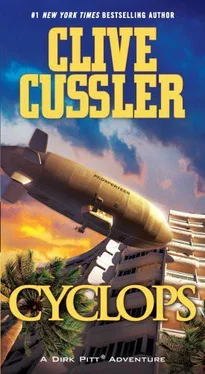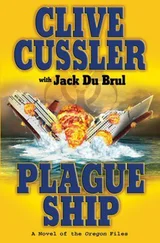The stars in the east were beginning to lose their sparkle as the shadowy hull of the Ozero Zaysan drew abeam. Pitt ordered All Stop as the tugboat came about under the bows. The Pisto's crew flung up a light heaving rope that was tied to a graduated series of heavier lines. Pitt watched from the bridge as they were hauled on board. Then the thick tow cable was taken up by a forward winch and made fast.
The same act was repeated on the stern, only this time with the port anchor chain from the dead and drifting Ozero Zaysan. After the chain was winched across, its links were tied to the after bits. The two-way connection was made. The three vessels were now tethered together, with the Amy Bigalow in the middle.
Jack gave a blast on the Pisto's air horn, and the tug began to ease ahead, taking up the slack. Pitt stood on the bridge wing and stared aft. When one of Manny's men signaled that the tow chain on the stern was taut, Pitt gave a slight pull on the steam whistle and swung the telegraph to Full Ahead.
The final step in Pitt's plan had been completed. The oil tanker was left behind, floating nearer the oil storage tanks on the opposite shore of the harbor, but a good mile farther from the more populated center of the city. The other two ships and their deadly cargoes were gathering way in their dash for the open sea, the tugboat adding her power to that of the Amy Bigalow to raise the speed of the marine caravan.
Behind them the great column of smoke and flame spiraled up into the early blue of morning. Clark had bought them enough time for a fighting chance, but he had paid with his life.
Pitt did not look back. His eyes were drawn like a magnet on the beacon from the lighthouse above the gray walls of Morro Castle, that grim fortress guarding the entrance to Havana Harbor. It lay three miles away, but it seemed thirty.
The die was cast. Manny raised power to the other engine and the twin screws thrashed the water. The Amy Bigalow began to pick up speed. Two knots became three. Three became four. She beat toward the channel below the lighthouse like a Clydesdale in a pulling contest.
They were forty minutes away from reaching home free. But the warning was out and the unthinkable was yet to come.
Major Borchev dodged the burning embers that fell and hissed in the water. Floating there under the pilings, he could hear the roar of automatic weapons fire and see the flames leap into the sky. The dirty water between the docks felt tepid and reeked of dead fish and diesel oil. He gagged and vomited up the foul backwash he had swallowed when the strange Cuban colonel shoved him over the side.
He swam for what seemed a mile before he found a ladder and climbed to the top of an abandoned pier. He spat out the disgusting taste and jogged toward the burning convoy.
Blackened and smoldering bodies littered the dock. The gunfire had stopped after Clark's few surviving men escaped in a small outboard boat. Borchev walked cautiously through the carnage. Except for two wounded men who had taken refuge behind a forklift, the rest were dead. His entire detachment had been wiped out.
Half crazed with anger, Borchev staggered among the victims, searching, until he came upon the body of Clark. He rolled the CIA agent over on his back and looked down into sightless eyes.
"Who are you?" he demanded senselessly. "Who do you work for?"
The answers had died with Clark.
Borchev took the limp body by the belt and dragged it to the edge of the pier. Then he kicked it into the water.
"See how you like it!" he shouted insanely.
Borchev wandered aimlessly amid the massacre for another ten minutes before he regained his balance. He finally realized he had to report to Velikov. The only transmitter had melted inside the lead truck, and he began to run around the waterfront, feverishly hunting for a telephone.
He found a sign on a building identifying a dockworkers' recreation room. He lunged at the door and smashed it open with his shoulder. He fumbled along the wall, found the light switch, and turned it on. The room was furnished with old stained sofas. There were checkerboards and dominoes and a small refrigerator. Posters of Castro, Che Guevara haughtily smoking a cigar, and a somber Lenin stared down from one wall.
Borchev entered the office of a supervisor and snatched up the telephone on a desk. He dialed several times without getting through. Finally he raised the operator, cursing the retarded efficiency of the Cuban phone system.
The clouds above the eastern hills were beginning to glow orange and the sirens of the city's fire squads were converging on the waterfront when he was finally connected to the Soviet Embassy.
Captain Manuel Pinon stood on the bridge wing of the Russian-built Riga-class patrol frigate and steadied his binoculars. He had been awakened by his first officer soon after the fighting and conflagration had broken out in the commercial dock area. He could see little through the binoculars because his vessel was moored to the naval dock around a point just below the channel and his vision was blocked by buildings.
"Shouldn't we investigate?" asked his first officer.
"The police and fire crews can handle it," answered Pinon.
"Sounds like gunshots."
"Probably a warehouse blaze that's ignited military supplies. Better we stay clear of the fireboats." He handed the glasses to the first officer. "Keep a watch on it. I'm going back to bed."
Pinon was just about to enter his stateroom when his first officer came running up the passageway.
"Sir, you'd better return to the bridge. Two ships are attempting to leave the harbor."
"Without clearance?"
"Yes, sir."
"Could be they're moving to a new mooring."
The first officer shook his head. "Their heading is taking them into the main channel."
Pinon groaned. "The gods are against me getting any sleep."
The first officer grinned sardonically. "A good Communist does not believe in gods."
"Tell that to my white-haired mother."
On the bridge wing once again, Pinon yawned and peered through the early-morning haze. Two ships under tow were about to enter the Entrada Channel for open seas.
"What in hell--" Pinon refocused the glasses. "Not a flag, not a navigation light showing, no lookouts on the bridge=
"Nor do they respond to our radio signals requesting their intent. Almost looks like they're trying to sneak out."
"Counterrevolutionary scum trying to reach the United States," Pinon growled. "Yes, that must be it. Can't be anything else."
"Shall I give the order to cast off and get under way?"
"Yes, immediately. We'll come around across their bows and block their way."
Even as he spoke, the first officer's hand was reaching for the siren switch that whooped the crew to action stations.
Ten minutes later the thirty-year-old ship, retired by the Russian Navy after it had been replaced by a newer, modified class of frigate, drifted broadside across the channel. Her four-inch guns turned and aimed almost point-blank at the rapidly approaching phantom vessels.
Pitt gazed at the blinking signal lamp on the frigate. He was tempted to turn on the radio, but it was agreed upon from the beginning that the convoy would remain silent in case an alert port authority official or security post receiver happened to tune in on the same frequency. Pitt's international Morse code was rusty, but he deciphered the message as "Stop immediately and identify."
He kept a sharp eye on the Pisto. He was aware that any sudden evasive move would have to originate with Jack. Pitt called down to the engine room and alerted Manny to the frigate blocking their course, but the brass telegraph pointers remained locked on Full Ahead.
They were so close now he could see the Cuban naval ensign standing stiffly in the offshore breeze. The vanes on the signal lamp flipped up and down again. "Stop immediately or we will open fire."
Читать дальше












